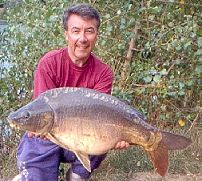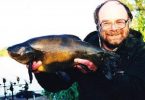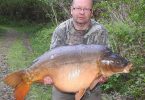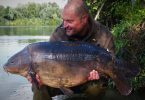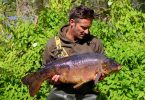The Swedish based tackle firm, ABU, used to produce a superb catalogue which, in addition to product information and exotic location ‘dream trip’ features, had what ABU called a ‘Solunar Table’. This table took the form of a calendar in which days were designated as being excellent, good or moderate. An American publication – I can’t recall which – went a stage further and beside certain dates had a little lawnmower symbol: the significance of which was that fishing was likely to be so poor on such days that we may as well stay home and cut the grass!
 Both the ABU and American good-day-bad-day fishing calendars were based on the phases of the moon. Not that they were the first to make such assumptions – references to fishing being affected by the moon can be found throughout angling literature.
Both the ABU and American good-day-bad-day fishing calendars were based on the phases of the moon. Not that they were the first to make such assumptions – references to fishing being affected by the moon can be found throughout angling literature.
How valid are such beliefs?
Professional nets men who intercept eels on their seaward migration find that catches are best during dark, new moon periods. Which may indicate a preference for dark, moonless nights – a sort of negative phototropism – or an evolutionary manifestation of the fact that the darker the night, the safer are migrating eels likely to be from predators. But whatever the reason, we have to acknowledge that eels are affected by Moon Phases – On Their Migration, At Least.
It seems reasonable to accept that fish living in the sea, estuaries and tidal stretches of river are influenced by the moon. Tides are a response to the moon’s gravitational pull; fish respond to tides; ergo, sea and estuarine fish respond to the moon – albeit, perhaps indirectly.
But what of fish in non-tidal stretches of river? And what of those in still waters? Are they, as suggested by ABU’s Solunar Table and the American ‘lawn mower’ calendar, affected by the moon’s phases?
In my previous incarnation as a night angler, I was never a big fan of moonlit nights. I can recall nights so bright that it was possible to read a book without the aid of a torch. All too often, such nights were unproductive. But was the full moon responsible for my blanks, or did it etch the blanks in my memory and thereby raise their significance. If truth be known, I suspect that I had just as many blanks during dark, new moon nights, but they failed to stick in my mind.
But Solunar and ‘lawn mower’ tables were not aimed solely or even primarily at night anglers; their target audience – given that the countries of origin were Sweden and the USA – were daytime fly and lure fishermen. In which case, it is not the light emitted by the moon which is deemed to have an effect, but its actual phase.
 Nowadays, being a day-only angler, I am generally unaware of which moon-phase we are in. Occasionally I notice unusually bright moonlight penetrating the closed bedroom curtains, and other times it might register that a night is particularly dark – but such instances apart, I go fishing blissfully ignorant of the moon’s phases. Depending on the weather, I can usually make a pretty accurate evaluation of my chances of success – irrespective of whether the moon is new, full, crescent, gibbous, waxing or waning. True, sometimes I fail when I expect to succeed, and vice versa; and while I concede that an extra factor, like perhaps the moon phase might play a part on such occasions, I think it more likely that unexpected failure is due to my having got it wrong, and unexpected success due to my having got lucky.
Nowadays, being a day-only angler, I am generally unaware of which moon-phase we are in. Occasionally I notice unusually bright moonlight penetrating the closed bedroom curtains, and other times it might register that a night is particularly dark – but such instances apart, I go fishing blissfully ignorant of the moon’s phases. Depending on the weather, I can usually make a pretty accurate evaluation of my chances of success – irrespective of whether the moon is new, full, crescent, gibbous, waxing or waning. True, sometimes I fail when I expect to succeed, and vice versa; and while I concede that an extra factor, like perhaps the moon phase might play a part on such occasions, I think it more likely that unexpected failure is due to my having got it wrong, and unexpected success due to my having got lucky.
So, does the phase of the moon make a difference? Are there days when fishing is likely to be excellent, and others when – to quote the American magazine – we may as well stay home and cut the grass?
The fact that I have insufficient interest in moon-phases to keep track of them, makes my position fairly clear – I don’t think the moon has any significant effect. Given favourable weather conditions, I fish with confidence. Given unfavourable weather conditions, I expect to struggle.
To hell with Solunar Tables! Leave the lawnmower in the shed, let the grass grow long, and go fishing – that’s what I say!
Jim Gibbinson

